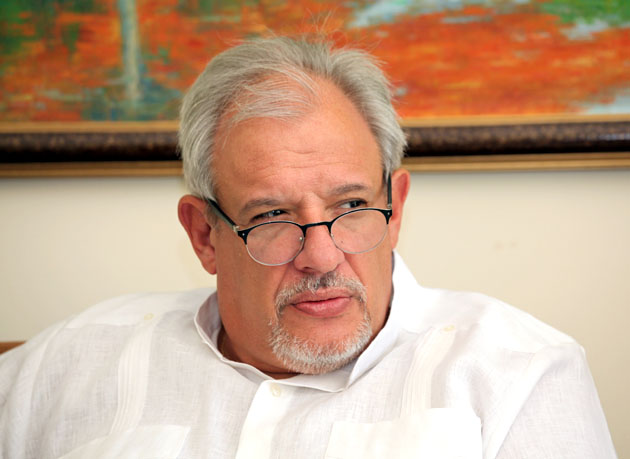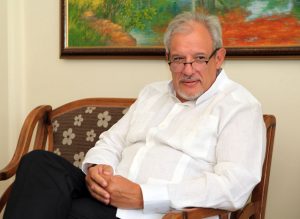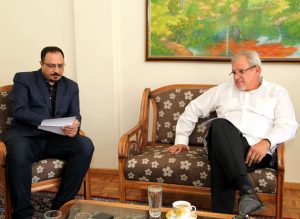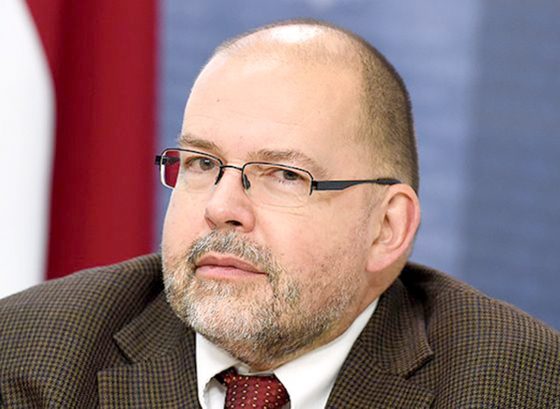“The main feature that distinguishes the government of President Miguel Diaz Canel is the continuity and fidelity to the legacy of Fidel and Raul” – says Cuban Ambassador to Iran.

In April 19, 2018, Miguel Diaz-Canel became Cuba’s President who was not a Castro for the first time in six decades. On the first round of his presidency, he promised to remain loyal to the values of the Socialist Revolution of Cuba, and further stressed the need to renovate the Cuban economy. To learn more of the Iran-Cuba ties in the days of the new President and how his election would affect the relations between Havana and Washington, we interviewed the new Ambassador of the Republic of Cuba to Iran, Mr. Alexis Bandrich Vega which you may find as follows.
AVA Diplomatic’s Exclusive Interview with
H.E. Mr. Alexis Bandrich Vega, Ambassador of the Republic of Cuba in Iran
Interview by Mohammadreza Nazari
Before your appointment as Cuba’s Ambassador to Iran, what other diplomatic positions did you serve in?
I have worked in the General Directorate of Latin America, in the Ministry of Foreign Relations
My first appointment as Ambassador was in the Dominican Republic, until 2014. Previously, I was appointed to the Permanent Mission of Cuba to the United Nations in New York, and to the Embassies of Cuba in Syria and Brazil.
Have the relations between Iran and Cuba seen any changes after the JCPOA?
Cuba is an independent and sovereign country that does not give in to pressures or blackmail from any other country. We make our decisions on our own and do not work under any foreign pressure.
In any case, I want to think that it would affect in a positive way. The ties between the two countries have been fine since 1979. We can increase economic, trade and cooperation relations – as has been the will of both governments, expressed on several occasions. A group of areas of common interest are identified, there is political will, and we can be more proactive and agile in fulfilling what we have agreed upon.
In 2015, when the JCPOA was born, everybody supported it.
Cuba has expressed its profound rejection of the decision of the US government to withdraw from the Nuclear Agreement, and the decision to impose sanctions or unilateral coercive economic measures. Failure to comply with this international commitment violates the rules of coexistence between States and can have serious consequences for regional and international stability and security. We call on all signatory parties to respect the nuclear agreement with Iran, while recognizing the legitimate right of any State to produce and make use of nuclear energy for peaceful purposes.
Saudi Arabia has provided Cuba with vast amounts of money entitled as loans. Can Saudi Arabia use that to pressure Cuba as to strain its ties to Iran?
I do not think so. Whoever thinks that this may be possible does not know Cuba, nor the Cubans, nor our history. Cuba maintains its relations with other States on the basis of the strictest respect for equality, sovereignty, national independence, non-interference in internal affairs, and in its international relations. We maintain relations with almost all the nations of the world (with advances in some areas more than in others), and we do not receive, nor accept in return, any type of pressures or political conditioning. I’m sure this has not happened.
When was the last session of the joint economic commission between the two countries? What was its achievement?
The last session was held in February 2017. This year the XVII Session of the Iran – Cuba Intergovernmental Commission will be held in Havana.
As I said there are many identified areas in which we have MOUs and some actions, for example: health, pharmaceutical, biotechnology, nanotechnology, hydraulics, food production, industry, energy, agriculture, as well as in others such as academia, media, postal mail, tourism, sports, etc.
What areas should be given more attention by the two countries’ authorities considering the economic potentials between them?
We are working in all the mentioned areas. Energy, pharmaceutics and biotechnology are the ones that have revealed most interests. We are working on streamlining the registration processes of the products in each country. Cuba has a product that is unique in the world: the Heberprot-P. It is registered in 27 countries, including Russia, Turkey, and The United States. There are similar products but none of them is effective in curing diabetic foot ulcers, even avoiding amputation in more than 70% of cases. Our scientists have also developed several very effective vaccines against cancer. Cuba places at the disposal of the Iranians medical services of high standard and good prices, which can be linked, according to the client’s wish, to extraordinary tourist attractions.
What part of drilling, discovery or petrochemicals does Iran-Cuba oil cooperation cover?
We have been observing the Iran’s oil market, and opportunities to develop the cooperation in this area. Our oil industry also needs to be extended and modernized. There are other needs related to the preparation of personnel, advice, and engineering. There are several areas where we could collaborate.
Have you had any talks with Iran’s Oil Ministry on the possibility of joint cooperation?
We are revitalizing them.
Has the creation of a banking credit line been helpful to the economic ties between the two countries?
Up until the credit line existed, it helped.
Is there any plan to reopen it?
I do not think it’s me who should answer that question.
How are banking relations under current circumstances?
Good. Due to the material, financial and economic blockade of the United States against Cuba, the refusals of third-country banks to carry out financial transactions related to Cuba have increased. Remain restrictions to establish direct banking relationships and the fear of the banks of third countries to develop relations with Cuba.
What MOUs have been signed between the two countries in terms of agriculture and biomedicine?
 Agriculture: plant health, pest and disease control, coffee and banana cultivation technology, citrus and fruit cultivation, fertilizer and biofertilizer production, renewable energy, irrigation systems, veterinary medicines, animal health and beekeeping.
Agriculture: plant health, pest and disease control, coffee and banana cultivation technology, citrus and fruit cultivation, fertilizer and biofertilizer production, renewable energy, irrigation systems, veterinary medicines, animal health and beekeeping.
Health: cooperation in research in medical services and medical education. Food safety, medicines, vaccines, medical and laboratory equipment. Primary care and universal health coverage.
As important as signing an MOU is to give continuity afterwards and fulfill them. Also, The International Fair of Havana is celebrated every year in Cuba. I think it is one of the main commercial events in our region. For many years Iran has not participated. This fair not only offers the approach to the Cuban market but also to dozens of countries and hundreds of companies that attend. It is a good opportunity that should not be missed.
It’s a question why businessmen do not use the potentials in Iran, where as a large number of Iranian tourists visit Cuba.
I think it depends on several factors. Some of them may be the long distance, the asymmetries of our economies, the prioritization of other markets, limitations related to credits, etc. Indeed the number of Iranian tourists visiting Cuba has been growing in recent years. This can help stimulate and consolidate relationships in other areas.
Has the technology of DTP-HepB-Hib been transferred to Iran?
It was recently signed, after a long negotiation, a Term Sheet for the Technology Transfer of the pentavalent vaccine. Sometimes technical and economic matters come up. We hope that in a short time the transfer is completed.
For now, we are negotiating two other vaccines so the two countries could produce them together, push them toward executive phases, and jointly conduct the research and production phases; a process which is still going through feasibility studies at the moment.
Do the two countries’ officials have any plan for military cooperation?
No.
What facilities have been considered for the expansion of tourism between the two countries in 2018? How many Iranians visited Cuba last year?
Cuba is basically a tourist destination country and has 69, 041 rooms, of them, 63% in 4 and 5 stars hotels, and 74.2% for sun and beach tourism, (we have more than 960 km of Beautiful beaches).
In 2017, Cuba reached a record of arrivals with 4 689 894 visitors. 15 of the 20 main issuing markets to Cuba will show growth with respect to 2016, especially the U.S., Russia, Italy and France.
In Cuba currently operate 17 cruise companies (the modality most used by the Iranians who visit us) with 25 ships. Experts from the cruise industry have ratified the Greater Caribbean as the first world market of this modality (7 thousand itineraries shared by some 26 States and territories).
The evaluation indicators show that the level of General Satisfaction reaches 95.1%, the Quality / Price average behaves to 87.6% of satisfaction, the recommendation level to 97.1%, and similar results are maintained in the repetition, where were reached 43.6%.
Among the 25 best beaches in the world, Varadero occupies the 3rd place. We have others in 7th and 12th place.
Attention to investors. We have development programs up to 2030, covering 610 projects. In 2018, 4 thousand 825 new rooms will be completed. By 2019, it is planned to complete 32 accommodation facilities with 5 thousand 249 rooms that are already in execution.
70 airlines connect Cuba with 73 cities in the world.
21 foreign managers of recognized international prestige manage hotels in Cuba with 45 thousand 333 rooms, 64.8% of the rooms in the country, are being operated under some of the modalities of foreign investment.
The portfolio of business opportunities for foreign investment in the Tourism sector of Cuba presents 140 projects that serve as a basis for establishing new international economic associations or new hotel and service administration and marketing contracts.
Tourism industry has, in fact, vastly contributed to Cuba in resisting US sanctions.
Cuba’s economy is open and it depends a lot on international markets. Every year, we buy a lot of food and other products in the international market. We are called to substitute most of these importations. Still an important part of the tourism earnings is used to buy supplies for this important sector of our economy.
The immense majority of the people who visit Cuba realize how many lies they have heard about our country.
Since the resumption of relations with the US and reopening of the Embassies, around 600 thousand Americans traveled to Cuba and it became evident that the people of the US like Cuba. If the first visitors went back and spoke of a bad experience on their visit to Cuba, then the rest of the Americans would have refused to go.
I believe this is why the U.S. governments limit the trips of their citizens to Cuba. It is not just an economic reason. They do not want them know the truth; they do not want them discover how liars their governments have been and how unjustifiable is the blockade against the island.
The Trump administration has greatly limited the travel of American citizens to Cuba.
In 2016, Cuba reported tourist revenues of more than 1.2 billion dollars in the first semester. The arrival of tourists to Cuba decreased by 7 percent in the first quarter of this year with but at the end of the semester the industry recovered so, Cuba maintains its commitment to welcome 5 million visitors in 2018.
I heard your cooking is very good.
Yes, it is a mixture of African and Spanish traditions. Unfortunately I am not a good cook.
Iranian cuisine is also very good, particularly the kebab, something I would like to learn to do before finishing my work here.
There are ongoing discussions in Cuba regarding the reformation of the 1976 Constitution. What aspects do these reformations cover?
In 2011 Cubans decided to start a process of updating our economic and social model, based on the fact that the model must be socialist, as it is the most humane, just and equitable that has existed up to now. Cubans want to build a prosperous and sustainable socialism.
This process must logically be reflected in the constitution, which needs to adjust to changes and new times.
On August 13, the debate process of a constitution project began in Cuba and outside Cuba. I cannot tell you what the main changes will be since we will have to wait for the end of the process of discussion and approval of them, and finally of the Constitution. I can tell you that it is a great democratic exercise and there is a lot of enthusiasm in the people that is showing high levels of participation. In each block, in each center of study and work, in mass organizations, in the Communist Party structures, in all the spaces of the country, the project is being discussed.
But we have gone further; Cubans living outside of Cuba have the right and the way to take part. This has no precedent in the history of our country and confirms the will of the government to have the opinion of all Cubans.
We have no doubt that this step will allow us to advance in the process of building Cuban socialism, a socialist, humanist, internationalist, democratic and solidary society, based on a fundamental premise: the UNITY of all our people around the Revolution, with everyone and for the good of all.
On July 21-23 were presented the preliminary draft of the constitution in the National Assembly (Parliament), 13.08 to 15.09 will be the popular consultation. After that should come a modification process based on the study and assessment of the criteria issued.
Next steps will be the approval in the National Assembly, the referendum and the promulgation of the new constitution. This is a real democratic process.
Will these amendments cover the case of purchasing lands and cars by foreigners in Cuba?
Regarding private property on land, the constitution project maintains a special regime, with limitations on its transmission and the preferential right of the State to purchase it at its fair price. We should see how it will pass.
There are many rumors on access to the internet in Cuba. What’s your view on this matter?
It cannot be ignored that due to the U.S. blockade Cuba partially and late entered cyberspace and when there was the dizzying expansion of broadband and the Internet, the White House brutally pressured those who offered those services to us to interrupt them right away. That is why until the arrival of the submarine cable coming from Venezuela in 2014, the Internet connection in Cuba was made exclusively through slow and very expensive satellite links. None of this was due to a Havana decision but to the stubbornness of Washington.
Internet is not bad by itself, but it can be used in an incorrect way and with bad intentions. It’s like a car, you can drive well and it does not cause any problems, or you can drive badly and do a lot of damage. We know the importance of Internet, but in our case, the development of access to it must go hand in hand with our ability to protect ourselves from the misuse of our enemies. You cannot be a bit naive in this regard. The Internet is a battlefield that we do not refuse (we have never done) but cybersecurity is very important.
Although the start date of the Internet access service from the mobile phone to natural persons is still unknown, the technological infrastructure for commercialization is almost ready. Cubans are preparing for this technological jump.
For some time Cuba has been enlisting this process with the decision to operate the cellular telephony networks by 900 MHz, 1 800 MHz and 2 100 MHz.
The moment is good for the implementation of this service since there are more than five million cell phones in Cuba (almost half of the population) and the growth rate oscillates around one million per year.
Access to the Internet through mobile telephony is one of our main objectives and for this we have the technological conditions aimed at guaranteeing the quality and security of the service.
After almost six decades, Miguel Diaz-Canel is the first Cuban President who is not a Castro. What changes has this election created in Cuba’s internal policies?
 If you asked me a couple of words to define the relationship or link between the Castros (as you say) and President Diaz Canel, I would use, to begin with, these two: continuity and fidelity.
If you asked me a couple of words to define the relationship or link between the Castros (as you say) and President Diaz Canel, I would use, to begin with, these two: continuity and fidelity.
He is driven down the bureaucracy. In a meeting with ambassadors in July, he said that a lot of job should be done out of the office It is impressive the amount of hours that President Diaz Canel spends working outside his office, visiting the whole country, walking through the streets, visiting the countryside, factories, schools, hospitals, research centers, participating actively in congresses and events, with the journalists, with the intellectuals, with the youth, talking with the people, listening to their problems and opinions, making decisions in the place, since they are accompanied by ministers and local leaders.
He dresses very modestly. I’ve seen him sweat like the most common of Cubans. He approaches to the groups, exchanges with them, gives them their support, with the sensitivity and humanism that should characterize every revolutionary.
When the problem exceeds our possibilities, with total honesty, he tells us that it cannot be solved at the moment, but it will be resolved little by little.
The people are happy with him, as it was, and it is happy with Fidel and Raul. They formed him and he has been, is and will be faithful to them.
How has Trump’s policy affected the ties between Washington and Havana?
The Trump administration has meant a setback in relations between the United States and Cuba reached in the last period of Obama.
The regulations issued on November 8, 2017 intensify the blockade, imposing additional obstacles to the limited opportunities of the US business sector. In Cuba and further restrict the right of Americans to travel to our country.
In recent months, the refusals of third-country banks to carry out financial transactions related to Cuba increased.
The trade continues in only one direction, the restrictions to establish direct banking relations remain and the fear of the banks of third countries to develop relations with Cuba is maintained.
The Obama administration imposed 56 fines on US and foreign entities, for a value of 14 thousand 396 million 883 thousand 576 USD. The Trump government has imposed 3 fines worth 527 thousand 778 USD. I hope that Trump doesn’t outpace Obama in this matter.
The damages accumulated by the blockade during almost six decades of application reach the figure of 933 678 000 000 dollars, taking into account the depreciation of the dollar against the value of gold in the international market
The blockade implies a massive, flagrant and systematic violation of the human rights of the Cuban people.
Cuban youth will never forget that they have been affected by this unfriendly US policy.
The blockade has shown for more than 50 years that it is a unilateral, failed and stagnant policy. The blockade must be dismantled unilaterally by the US, completely and without trying to impose conditions on Cuba.
The world criticizes it and demands its end. The resolution of the UNGA, adopted on November 1, 2017, with a vote of 191 Member States in favor and only 2 against: USA. and Israel, demonstrates the overwhelming support of the international community against the blockade.
The Cuban people are deeply grateful for the solidarity and support received from the Iranian government during these long and hard years of struggle against the blockade and trusts that we will continue to count on its support.
Despite all that, how has Havana’s foreign policy been toward Washington?
Relationships will have to change at some point. We are neighbors and none of us can move to another place. We have to live with our differences. They have no right to do anything to change our government and system, as we do not have to change theirs.
We are ready to talk without conditioning.
The unilateral sanctions, the subversion, are unacceptable. I know it is very difficult for the United States to stop thinking like an empire, but that way it has not worked with Cuba it’s not going to work.
They have to stop all their aggression against Cuba: on radio, television and the internet as well as their financial support to his mercenary’s puppets in Cuba. They must return us the territory illegally occupied in the province of Guantánamo. They shouldn’t threaten and pressure those countries who maintain good relations with us. When all that comes to an end, we will have a fine relationship with the US; but until that day comes, we continue our resistance.




